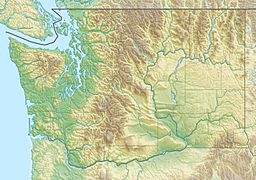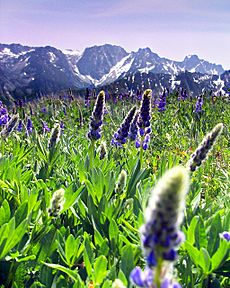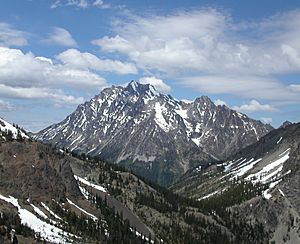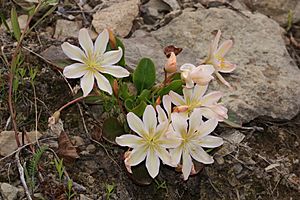Wenatchee Mountains facts for kids
Quick facts for kids Wenatchee Mountains |
|
|---|---|
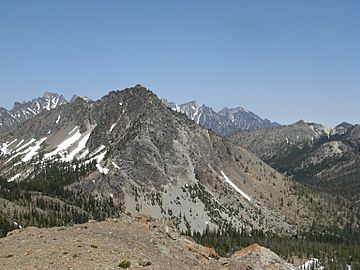
Bills Peak in the Teanaway area
|
|
| Highest point | |
| Peak | Mount Stuart |
| Elevation | 9,415 ft (2,870 m) |
| Dimensions | |
| Length | 50 mi (80 km) east-west |
| Geography | |
| Country | United States |
| Parent range | Cascade Range |
The Wenatchee Mountains are a cool mountain range in central Washington State, USA. They are a big part of the Cascade Range and stretch about 50 miles (80 km) east from the main Cascade mountains. These mountains act like a natural wall, separating the water from the Yakima River and the Wenatchee River. The highest parts of the range also form part of the border between Chelan and Kittitas Counties.
Contents
Exploring the Wenatchee Mountains
The Wenatchee Mountains are known for many amazing natural features. A famous climber named Fred Beckey described this area as the land between the Wenatchee and Yakima rivers, reaching up to Stevens Pass.
Cool Features to Discover
Some of the most exciting parts of the Wenatchee Mountains include:
- Mount Stuart: This is the second-highest non-volcanic mountain in Washington. It's one of the biggest granite mountains in the whole United States!
- The Enchantment Lakes Basin: This area is super beautiful. It's famous for its stunning lakes and rocky landscapes, all carved out by ancient glaciers. It's truly a magical place.
- Icicle Creek: This creek flows through a very deep, U-shaped valley. It's one of the deepest valleys in the Cascade Mountains, going down over 6,000 feet (1,800 meters)!
- Tumwater Canyon: The Wenatchee River flows through this winding gorge, creating a unique and scenic path.
Where Are the Wenatchee Mountains?
To get a better idea of where these mountains are, imagine a map. According to Peakbagger.com, a website that tracks mountains, the Wenatchee Mountains are surrounded by:
- U.S. Route 2 from Stevens Pass to the city of Wenatchee by the Columbia River.
- The Columbia River itself, heading south to Interstate 90.
- Interstate 90, going west towards Cle Elum and Roslyn.
- Then, the boundary goes north along Cle Elum Lake and the Cle Elum River back up to Stevens Pass.
Smaller Mountain Groups Inside
The Wenatchee Mountains are so big that they have smaller mountain groups within them. Some of these include:
- The Chiwaukum Mountains, with their highest point being Big Chiwaukum Mountain (8,501 feet or 2,591 meters).
- The North Wenatchee Mountains, home to Cashmere Mountain (8,501 feet or 2,591 meters).
- The Stuart Range, which includes the mighty Mount Stuart (9,415 feet or 2,870 meters).
- The Teanaway Area, where you'll find Ingalls Peak (7,662 feet or 2,335 meters).
- The Mission-Naneum Ridges, with Mission Peak as their highest point (6,876 feet or 2,096 meters).
Tallest Peaks of the Wenatchee Mountains
Here is a list of some of the most important and tallest peaks in the Wenatchee Mountains:
- Mount Stuart - 9,415 feet (2,870 meters) - 47°28′30″N 120°54′11″W / 47.4751179°N 120.9031444°W
- Dragontail Peak - 8,809 feet (2,685 meters) - 47°28′43″N 120°50′00″W / 47.4787301°N 120.8334210°W
- Cannon Mountain - 8,579 feet (2,615 meters) - 47°30′09″N 120°48′07″W / 47.5026194°N 120.8020322°W
- Enchantment Peak - 8,520 feet (2,597 meters) - 47°29′15″N 120°48′23″W / 47.487609°N 120.806379°W
- Witches Tower - 8,520 feet (2,597 meters) - 47°28′36″N 120°49′32″W / 47.476586°N 120.82555°W
- Colchuck Peak - 8,507 feet (2,593 meters) - 47°28′37″N 120°50′42″W / 47.4770632°N 120.8450878°W
- Little Annapurna - 8,458 feet (2,578 meters) - 47°28′05″N 120°48′52″W / 47.4681749°N 120.8145314°W
- Cashmere Mountain - 8,448 feet (2,575 meters) - 47°33′31″N 120°50′49″W / 47.5587294°N 120.8470346°W
- Sherpa Peak - 8,478 feet (2,584 meters) - 47°28′19″N 120°53′19″W / 47.4720626°N 120.8886996°W
- Argonaut Peak - 8,369 feet (2,551 meters) - 47°28′12″N 120°51′41″W / 47.4701186°N 120.8614768°W
- McClellan Peak - 8,225 feet (2,507 meters) - 47°28′11″N 120°47′10″W / 47.4698420°N 120.7861976°W
- Eightmile Mountain - 7,864 feet (2,397 meters) - 47°31′55″N 120°53′47″W / 47.5320619°N 120.8964793°W
- The Cradle - 7,231 feet (2,204 meters) - 47°33′39″N 121°01′56″W / 47.5609482°N 121.0323157°W
- Hawkins Mountain - 7,160 feet (2,182 meters) - 47°27′01″N 121°00′05″W / 47.450244°N 121.00128°W
- Granite Mountain - 7,064 feet (2,153 meters) - 47°34′51″N 121°05′24″W / 47.5809471°N 121.0900950°W
- Earl Peak - 7,018 feet (2,139 meters) - 47°24′36″N 120°50′34″W / 47.4099356°N 120.8428454°W
- Mac Peak - 6,837 feet (2,084 meters) - 47°37′39″N 121°07′29″W / 47.6276126°N 121.1248190°W
- Thunder Mountain Lakes Peak - 6,711 feet (2,046 meters)
- Trico Mountain - 6,604 feet (2,013 meters) - 47°35′49″N 121°06′47″W / 47.5970577°N 121.1131513°W
- Thunder Mountain - 6,407 feet (1,953 meters) - 47°39′28″N 121°07′11″W / 47.6578899°N 121.1198198°W
- Slippery Slab Tower - 6,356 feet (1,937 meters) - 47°40′07″N 121°07′34″W / 47.668645°N 121.126119°W
Plants and Wildlife in the Wenatchee Mountains
The Wenatchee Mountains are special because they are in the "rain shadow" of the main Cascade Range. This means they get less rain and have fewer trees. Because there are fewer trees, you can enjoy amazing views and see lots of beautiful wildflowers.
Unique Plants of the Wenatchee Mountains
The mountains also have special "serpentine soils." These soils change the types of plants that can grow there. This is why you can find many rare and unique plants in the Wenatchee Mountains. Some of these special plants include:
- Androsace nivalis var. dentata
- Claytonia megarhiza var. nivalis
- Delphinium viridescens
- Lewisiopsis tweedyi
- Trifolium thompsonii
- Valeriana columbiana
One of the rarest plants in Washington is the Wenatchee Mountains checkermallow (Sidalcea oregano var. calva). It only grows along Peshastin Creek, which is south of Leavenworth, Washington. This plant is so rare that it is now on the endangered species list, meaning it needs special protection to survive.
 | Tommie Smith |
 | Simone Manuel |
 | Shani Davis |
 | Simone Biles |
 | Alice Coachman |


